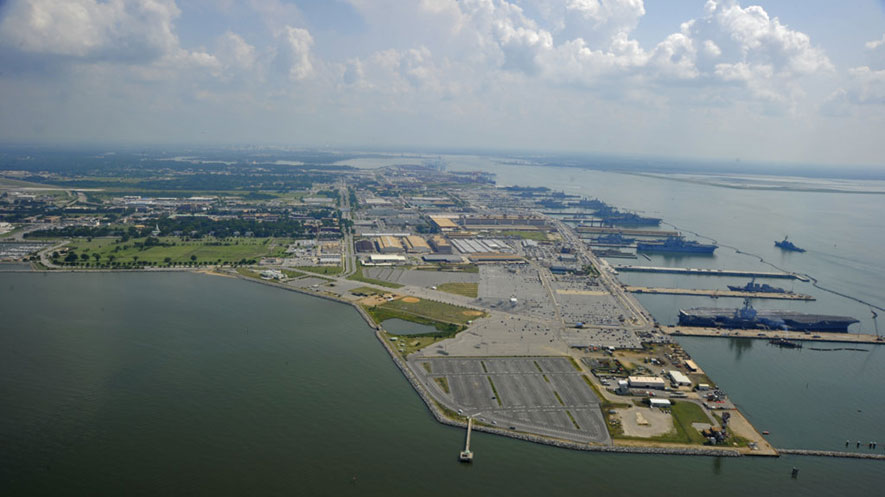Imagine Naval Station Norfolk, the largest naval base in the world, complete with fourteen piers and eleven aircraft hangars, submerged by seawater.
That scenario is not far from reality — Norfolk is located in the Hampton Roads, Virginia area, which has seen the highest rates of sea level rise along the eastern coast of the U.S. Its vulnerable location and vital importance to the nation made the area an ideal pilot project, born out of President Obama’s 2013 executive order for the U.S. to prepare for the impacts of climate change. The two-year Hampton Roads Sea Level Rise Preparedness and Resilience Intergovernmental Pilot Project (IPP) was launched in 2014 and headed by Old Dominion University.
The overall mission of the IPP was to establish a “regional whole of government and whole of community” approach to effectively prepare for sea level rise and to create resilient communities. At a World Resources Institute panel discussing conclusions from the recently-completed Phase 2 Report, Mr. David Adams (Director for Health Security and Climate Resilience Policy, National Security Council Staff, Executive Office of the President) commended these efforts, calling the work in Hampton Roads a “perfect example” of regional federal agencies working with their state and local counterparts towards resilience. He went on to highlight the importance of this in the context of the new Presidential Memorandum establishing a policy that federal agencies consider the effects of climate change when developing national security plans. Retired U.S. Navy Vice Adm. Dennis McGinn (Assistant Secretary of the Navy (Energy, Installations & Environment), United States Navy) agreed, calling the IPP a “tremendous model” that can be applied around the country to create solutions to climate change and sea level rise impacts on communities and federal infrastructure.
COL President Retired U.S. Navy Rear Adm. John White highlighted key takeaway points from the project. Ranging from the ocean, atmospheric, and earth sciences to social and health sciences, the importance of interdisciplinary science to examine the effects of climate change is critical, and he encouraged a multi-faceted approach for our “science-driven society.” White spoke of the importance of both consistency in planning from the regional to the national level and of looking ahead and factoring in potential effects of climate change in current decision-making to lessen future impacts. Finally, he lauded Old Dominion University for its excellent work in creating a road map for others and stressed that now that the IPP has been established, efforts must be focused on the actual plan: “who’s going to do what, why, when, where.”
The leaders of this project also hope other coastal communities will use the IPP as a template to embark on their own project. Retired U.S. Navy Capt. Ray Toll, Director of Coastal Resilience Research at Old Dominion University, spoke about how this report shows that other urban areas around the country are also capable of undertaking an IPP. This would allow universities to partake in research, provide expertise, and be a community resource and partner in the work to protect the nation against climate change. Moreover, McGinn stated the IPP framework is an important guide for future investing and wise spending for climate resiliency that can help create jobs, bolster the economy, and maintain public safety. Panelists were overwhelmingly in agreement in their support of IPP strategies and its applicability to regions across the nation. It was made clear that the roadmap has been set; now it is time to get to work to make coastal communities more resilient to rising seas and changes in climate. To see Toll’s 2016 Public Policy Forum presentation on the IPP, click here.





